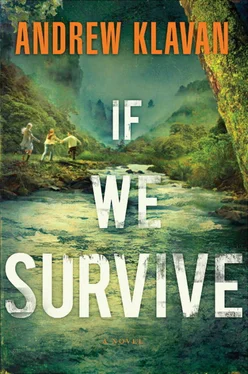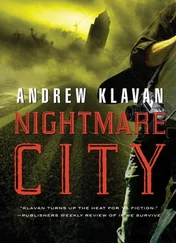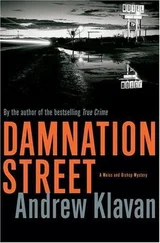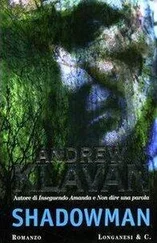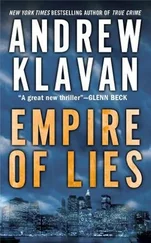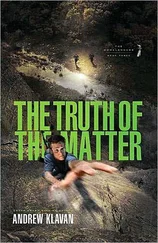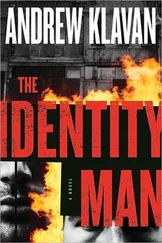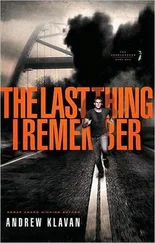“Come up to the dry land out of the mud,” she said.
And she walked back to Nicki.
For a moment or two, I just went on sitting there. I was trying to hold on to the moment, I guess, to hold on to the feel of her lips on me, her kiss. It wasn’t the kiss I would have had from her, I’ll admit, but it was still a good one. I thought I would’ve faced any number of crocodiles for another.
I looked around in a kind of daze and saw Palmer. Grimy, soaking, unshaven, he was kneeling in the dirt, working his strap back onto his rifle. He winked at me. I smiled.
Slowly, groaning with the effort, I worked my way up out of the mud. I stood and turned my back on the river and looked up the bank into the surrounding trees.
The jungle, I saw, was filled with gunmen.
I don’t know how many there were: maybe a dozen. They were stationed just within the trees, nearly hidden by the giant fronds and dense leaves all around them. They looked like villagers, like the folks back in Santiago. They had flat, dark brown Indian features. They wore jeans and cotton shirts and some of them had baseball hats. A few wore kerchiefs tied around their necks or foreheads, like the rebels did, only their kerchiefs were blue instead of red. Each of them was holding a rifle in his hand, low by his side.
“Uh…,” I said.
Kneeling over his AK, Palmer glanced up at me questioningly. I gestured with my head toward the jungle.
He looked that way—and he practically jumped to his feet. At first I thought he was going to raise his gun and open fire. Instead, he grinned. The gunman standing closest to us—a very large, very broad-shouldered man—also grinned, his smile white in his red-brown features. He came forward out of the trees. The other men followed him onto the riverbank, toting their rifles with them.
Until that moment Nicki, Meredith, and Jim hadn’t seen the gunmen. They all started in surprise when they did and Nicki moaned, “Oh no!” as if this were the last straw, as if she just couldn’t take any more excitement.
But Palmer and the large gunman were already grasping each other’s hands and slapping each other’s shoulders in a friendly greeting.
“Paolo,” Palmer said.
“Amigo,” said the gunman.
The two of them started talking to each other in rapid Spanish. Palmer laughed. He turned to us, his features unusually bright.
“He says they got word of what happened to us back in Santiago. They’ve been expecting us.”
“You mean they’re not rebels?” asked Jim.
“Not hardly,” said Palmer with another laugh. “They’re Achil—one of the oldest and purest tribes in the country. I was heading toward their village. It isn’t far. They’ll take us there and give us a ride to Santa Maria.”
Palmer and Paolo talked some more in rapid Spanish. Palmer pointed at the river, then at Nicki, then at me. I guessed he was telling him what had just happened with the rapids and the crocodile and all. Paolo nodded judiciously, looking my way. Then he moved away from Palmer and stepped up to me.
He was even bigger up close. I’d bet he was six-five or so. He towered over me. He looked down at me from his great height and nodded. He spoke in Spanish very quickly. He pointed out at the river—to the place in the rocks where I’d just been stuck. Then he pointed over at Nicki. Finally, he reached out with one enormous fist and pounded me lightly on the heart. It was just a tap, but he was so large it knocked me back half a step. Then he tapped his own heart as well.
“What’s he saying?” I asked Palmer.
“He says you’re the single ugliest little punk of an American he’s ever seen,” Palmer said. “He says they’re thinking of shooting you just to save the women from the misery of having to look at you.”
Meredith gave that laugh—that girlish giggle I’d heard in the temple chamber the night before. “Palmer, stop,” she said.
The big villager gave me a playful slap to the side of the head—which nearly knocked me unconscious—and walked away. He headed into the jungle with the other villagers behind him. Palmer gathered his weapons and Jim got his pack and they followed. Meredith helped Nicki to her feet.
“That isn’t really what he said, Will,” Meredith told me. “He said…”
“I get it, I get it,” I said—and, embarrassed, I hurried off into the jungle before she could tell me anything else.
We moved through the trees quickly now. I couldn’t see any trail, to be honest, but the natives seemed to see one well enough. They moved through the branches and leaves as if on some invisible path of least resistance. Simply by staying in their wake, we were able to move along far easier than we had before.
The land started to rise. We were climbing a hill. It was still hot, and soon we were all panting and sweating as we trudged along. After about half an hour, the villagers stopped. They had canteens strapped to their belts and they shared the water with us. That made us all feel stronger and we continued up the slope.
Palmer and Paolo walked together and as they walked, they kept up a steady dialogue in Spanish. I couldn’t understand what they were saying, of course, so after a while I stopped listening. Their talk just became another of the jungle noises.
After another half hour or so, the jungle seemed to grow a little thinner around us. We broke out of the trees as we reached the top of the hill. There was a village there. Not much. Just a bunch of little cinder-block-and-plaster houses with red-shingled roofs arranged around small gardens and fields. There was a central stone plaza that had a large round well. And lots of laundry lines strung up between one house and the next with clothes hanging from them. The place occupied a small clearing at the top of the hill and spilled down the opposite slope. There was more jungle surrounding it, but I could also see a dirt road winding off into the distance and several ancient green pickups parked nearby.
Most of the men of the village seemed to have come down to find us and walk with us, but the women and children were here in the village and they poured out of their houses and climbed up from their fields to meet us. They seemed especially glad to see Palmer. Several of the women kissed his cheeks and the children danced around him and plucked at his jeans for attention. The women made a fuss over Meredith and Nicki too—which Nicki seemed really grateful for.
I moved up beside Jim. He was standing off to one side by himself. His skinny, stoop-shouldered figure seemed sort of pulled into itself as if for protection. Those buggy eyes of his were scanning the village scene intensely, his thin lips pressed together.
I stood next to him and gestured at the sky. Now that we were out of the thick trees, I could see that the clouds had covered the blue completely while we walked. The clouds were still a light gray, but they were darkening by the minute.
“Guess the thunderstorms are on their way,” I said, by way of making conversation.
“They murdered these people,” Jim answered. “They wiped out whole villages.”
Well, it wasn’t the usual answer to a remark about the weather. So I said, “What? Who did?”
“The soldiers—the government. To try and suppress the rebel movement, the government sent soldiers into the native villages to terrorize them. They slaughtered men, women, and children.” He looked at me with his intense, intelligent eyes. “That’s what men like Fernandez Cobar and Mendoza are fighting. That’s what they’re rebelling against.”
I looked around at the villagers—all of them seemed to be out in the open, greeting Palmer, fussing over Nicki and Meredith.
“These folks all seem okay.”
Читать дальше
